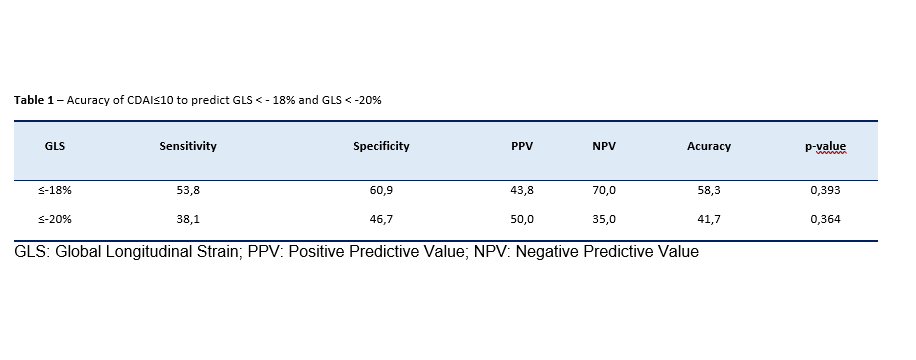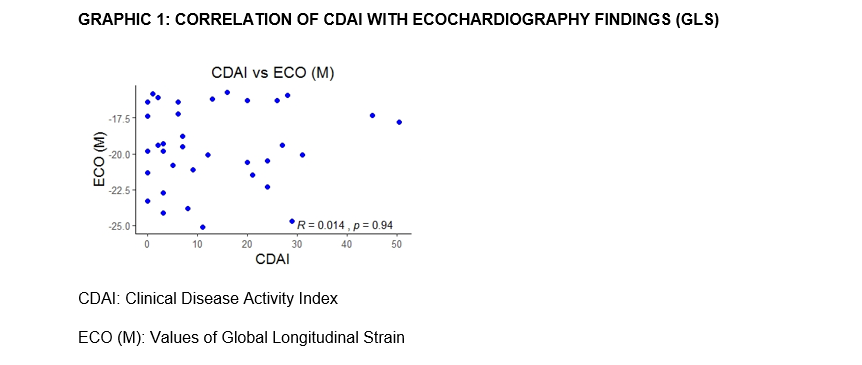Session Information
Date: Tuesday, November 12, 2019
Title: RA – Diagnosis, Manifestations, & Outcomes Poster III: Comorbidities
Session Type: Poster Session (Tuesday)
Session Time: 9:00AM-11:00AM
Background/Purpose: The risk of developing heart failure (HF) is twice as high in the RA population. It is hypothesized that, in addition to the atherosclerotic ischemic component and the traditional risk factors, there is a mechanism of cardiotoxicity related to the inflammatory pathways. A few previous studies indicate an association between disease activity and myocardial dysfunction, but they involved elderly population with comorbidities and in use of TNF-α inhibitors. Our main objective is to evaluate the correlation between clinical disease activity index (CDAI) and global longitudinal strain (GLS) — the most sensitive echocardiographic method to detect changes in ventricular contractility — in a RA population without cardiovascular risk factors and using only conventional synthetic DMARDs.
Methods: From June 2016 to January 2019, RA patients were selected to perform transthoracic speckle tracking echocardiography for GLS evaluation. Patients aged 18-60 years and classified according to ACR 2010 criteria were included. Patients with diabetes mellitus, uncontrolled hypertension, smokers, BMI >35, atherosclerotic disease history, and in use of biological medication were excluded. Patients underwent a clinical evaluation in which a single physician measured the CDAI and, within a period of one month, an echocardiographer blinded to the patient’s clinical data assessed the GLS. Student’s t-test and Spearman correlation were used for statistical evaluation.
Results: Results: Thirty-six patients (91.7% female, with ages ranging from 16 to 56 years) participated in the study. No correlation was found between CDAI and GLS values (Graphic 1). There was no adequate accuracy between values of CDAI≤10 and GLS< -18% and GLS< -20% (values considered normal), according to Table 1. The presence of RF, anti-CCP and the disease duration were also not associated with CDAI values.
Conclusion: Data from this study (small but with highly selected population) do not corroborate the association of CDAI with myocardial dysfunction and question whether there is a cardiotoxicity factor linked to the disease. Traditional risk factors, subclinical atherosclerotic disease, and cardiotoxic drug effects should be the subject of studies designed to explain the higher prevalence of HF in the RA population.
To cite this abstract in AMA style:
Pugliesi A, Nourani H, Matos Souza J, Bertolo M. Treat to Target Is Not Linked to Best Myocardial Strain Indices: Is There Really a Myocardial Dysfunction Directly Associated with Disease Activity? [abstract]. Arthritis Rheumatol. 2019; 71 (suppl 10). https://acrabstracts.org/abstract/treat-to-target-is-not-linked-to-best-myocardial-strain-indices-is-there-really-a-myocardial-dysfunction-directly-associated-with-disease-activity/. Accessed .« Back to 2019 ACR/ARP Annual Meeting
ACR Meeting Abstracts - https://acrabstracts.org/abstract/treat-to-target-is-not-linked-to-best-myocardial-strain-indices-is-there-really-a-myocardial-dysfunction-directly-associated-with-disease-activity/


